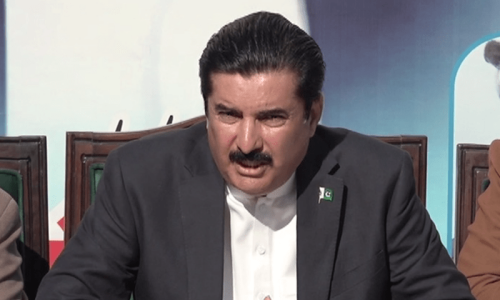RAWALPINDI: Located in front of the General Headquarters (GHQ) of the Pakistan Army, an old milestone installed during the British Raj tells stories of when colonial forces would frequently move from Delhi to Rawalpindi, the northern headquarters of the Indian Subcontinent.
Marking the exact length of the Grand Trunk Road from Kabul to Delhi, the milestone is a token from the days when Pakistan, India, Bangladesh and Afghanistan were connected via a single road.
It marks the spot where Delhi is 785km away and Kabul is 393km away.
G.T. Road starts from Chittagong in Bangladesh and goes through Delhi and the northern parts of Pakistan to terminate in Kabul.
Many historians believe that G.T Road, also known as Shahrah-i-Azam, was built by Chandragupta Muaryia, an Indian Raja, to connect Indian states with Central Asia and Tashikala or Taxila.
It was rebuilt, maintaining the same route, by Indian King Sher Shah Suri.
The milestone was installed by the British when the GPO was constructed in 1876 in Rawalpindi. The structure is reminiscent of the previous century and is an important marker of the heritage of the city.
The milestone was redesigned recently by the Rawalpindi Cantonment Road (RCB).
“We did not change the milestone but converted the distance from miles to kilometres,” said a senior RCB officer.
He told Dawn the change was made to facilitate citizens as Pakistan uses the metric system and that plans have been made to preserve old signs.
RCB wanted to preserve old milestones but they have disappeared with the start of development in the area and road widening projects. He said such a milestone was also installed near Pirwadhai Mor but it is not there anymore.
He explained that the Highway Department is responsible for protecting heritage items along the main roads.

Centre for Culture and Development Adviser Dr Nadeem Omar Tarar said G.T. Road was the main road in the Indian Subcontinent and the main economic corridor.
“All the main inns were established along this road as well as all the trade centres and markets,” he said.
Kos minars were established along G.T. Road in during the Mugal era as well as wells and trees. The kos minars were replaced with milestones during the British Raj, which are rare to find now.
A long-time resident of Saddar, Attiqur Rehman said heritage items and structures in the cantonment areas have disappeared with time as the cantonment boards did not preserve them.
“Many buildings in The Mall should be preserved such as the Odeon Cinema and Roomi Park,” he said.
Roomi Park was established in 1903 by the British in memory of Gen Sir William Stephen Alexander Lockhart who passed away in Calcutta on March 8, 1900.
A tomb was also established for the general on the orders of the then commander-in-chief of the British Army in India.
But due to the RCB’s negligence, the plaque on the tomb was damaged and was not restored.
Former district nazim Raja Tariq Kiani told Dawn that many such milestones in the Potohar region are still standing and that they should be preserved.
He said he constituted a committee during his tenure to preserve historical structures but the committee was dissolved after the change in the local government system.
He suggested G.T. Road and the structures along it should be preserved as it is the main artery between two countries and has a lot of history.
Chaklala Cantonment Board (CCB) Vice President Raja Irfan Imtiaz, who is a long-time resident of Rawalpindi, said he had tried to locate old milestones in the limits of the CCB as G.T. Road runs through it but could not find any.
“It is a good thing that the RCB has preserved the milestone in its area in its original form,” he said.
Published in Dawn, December 30th, 2018












































